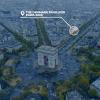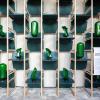
Shaping the Cities of the Future
Denmark, and Copenhagen in particular, is at the forefront of smart city development, a powerful global development movement following mass urbanisation.
The rapid expansion of cities calls for new digital solutions to help manage an increasing demand for energy, water, public transport and effective government. These so-called smart city schemes use digital technology to use resources better and create fewer emissions and less waste. It means smart urban transport, upgraded public water supply and waste disposal, and intelligent heating systems, all aiming to maintain and develop a good standard of living for the city’s inhabitants.
Denmark is a key driver in developing smart city schemes to meet these new requirements while keeping the need for a good quality of life for urban citizens in focus. With initiatives like intelligent transport systems, conscious waste handling, climate adaptation management and e-Government, Denmark sets the scene for a smart and sustainable future for all and acts as a model for many other cities.
Interactive City Administration
By showing political vision, willingness to invest, adept public administration, and a strong culture of innovation and collaboration, Denmark has become a key driver in e-Government, the digitisation of communication between citizens and the public administration. It was placed second to Finland in Europe on the Digital Economy and Society Index in 20221. Everybody in Denmark is required to have CPR (central personal register) number, which gives citizens access to a digital identity, used in all government business for example school registrations, healthcare and taxation. These authorities communicate by digital post to citizens, keeping a clear flow of information and data.
Beyond everyday administration, which is handled largely digitally, Denmark is always seeking new and more efficient solutions for life and to improve the quality of life in its cities. Copenhagen Solutions Lab is the Smart City incubator in Copenhagen. It works with companies and citizens, testing new technologies and ideas in real-life settings. This allows for successful real-life learning and for a great understanding of how people actually use the technology presented to them.
Projects hatched here also include an exciting collaboration with Google on measuring air pollution, as well as initiatives on smart parking, smart traffic lights, smart grid systems, measuring real-time energy consumption and production, mobility, and the creation of a Europe-wide ‘internet of everything’ platform for open innovation. As a result, cities across the world are now implementing their own ‘Solution Labs’ based on the takeaways developed in Copenhagen.
Intelligent Transport
For many years, Copenhagen has been as an example of a cycling capital, and today is a city where more than a third of all trips to work and to study are taken by bike2. Denmark has a cycling embassy which exists to share knowledge and expertise about cycling and urban development around the world.
Alongside its pioneering cycling culture, which includes wide safe cycle paths and cycle superhighways, where cycle commuters’ needs are prioritised, the city’s efficient public transport also helps to shape a city where traffic is reduced, even as its population grows. Since October 2022, biogas from Copenhageners’ food waste has been sent to the natural gas network, meaning that city buses, garbage trucks and private homes are powered in part by waste.

Improving Efficiency in Energy Use
In recent years, Denmark has leaned into using smart systems for energy use, thinking through sustainable options in terms of architecture and design and shaping new systems to do more with less in municipal buildings in particular. Using AI tools, Copenhagen Solutions Lab has been working on a project to reduce CO2 emissions and the municipality's heating and electricity bill, while maintaining a good indoor climate in the buildings. The output will be concrete AI tools that can be used to optimise energy-efficient operation and indoor climate, while considering fluctuating loads in the supply network.
Architecture is always in focus in Copenhagen, the current UNESCO World Architecture Capital, and innovative solutions abound. The city’s Opera House is set on the harbour and uses a seawater cooling system to offer an energy-efficient alternative to air conditioning. Further down the harbour in Nordhavn, the UN City Headquarters goes one further, using rainwater to flush toilets, and, like the Opera House, is covered with solar panels. They are just two examples of major city buildings with a smaller than average carbon footprint.
Denmark’s homes are powered through a district heating system, which offers stable energy consumption and less wastage overall. Heat is produced from municipal waste, biomass, wind and solar energy. In Copenhagen, Copenhill is an example of a unique heat and power plant, a building so clean that it can co-exist in the heart of a major city and even host leisure facilities – including a ski slope and a climbing wall on the roof and sides. Designed by Danish firm BIG, it opened in 2017, replacing a 600 MW coal-burning power plant, and was voted World Building of the Year 3in 2021.
Securing the Future Water Supply
In Denmark’s second city, Aarhus, water management is in focus with a project called ‘Cities in Water Balance’. The project aims to develop systems to mitigate future problems relating to climate change in the drinking water supply, by connecting the 1500 km of pipes in the water system and setting up active data monitoring to establish speed of water flow and changes in water quality. Environmentally damaging substances can be removed from the system and the quality of water can therefore be maintained.
Among the many innovative sustainability projects taking place in Denmark, adapting the country’s ancient cities to a future under climate change has been prioritised. In Copenhagen, a project has been developed to help citizens walk on water. Climate Tiles, from the Danish company Third Nature in cooperation with IBF and ACO Nordic, is a scalable climate adaption solution for future cities’ pavements and urban spaces that handles scarce water resources through a simple technical tile system. Water from pavements is led through holes in the tiles and to integrated pipes which can lead to water stores, mitigating the issue of cloud bursts and overwhelmed wastewater systems, which lead to flooding.
The Supermarket of the Future
Finally, to continue the theme of creating liveable, efficient cities of the future, Danish firm Danfoss turned to the idea of the supermarket. They opened the Smart Store Supermarket in June 2023 in Nordborg, aiming to show how easy and cost-effective it can be to use reliable and sustainable energy to power a supermarket. Their prototype uses solar panels, offers charging stations for electric cars, and recycles the heat emitted from its fridges and freezers to heat the supermarket itself. Using sustainable energy sources throughout, it is hoped this will be the first of many low-energy supermarkets using 50% less energy than a typical supermarket.
Discover more ideas and examples of how the Danes are creating the smart cities of the future at The Denmark Pavilion.
Facts about Smart Cities
|
EDITOR'S NOTESThe Denmark Pavilion is open to the public 26 July–11 August; 11am-10pm (except August 1, from 11:00 to 16:00). Admission is free. WHAT'S ON To stay updated re. What’s On at The Denmark Pavilion, go to: denmarkpavilion.com SoMe hashtag: #denmarkpavilion2024 FURTHER INFO / CONTACT INFORMATION Media attending the Olympic Games are more than welcome to visit The Denmark Pavilion and to contact the press team for further details. Please reach out to PR & Press Manager Lasse Emil Kristiansen at laekri@visitdenmark.com or +4531415390. WANT TO KNOW MORE? Visit stateofgreen.com HIGH RES. IMAGES TO GO Download images and videos from The Denmark Pavilion in Paris and from our extensive Denmark media database here: https://www.visitdenmark.com/denmark-pavilion/images ABOUT THE DENMARK PAVILLON During the Paris Olympics, visitors from around the world can enjoy a free visit to a small piece of Denmark at Champs-Élysées. Here, they can encounter Danish ideas that contribute to creating a better life and a better world. VisitDenmark, in collaboration with the Ministry of Industry, Business and Financial Affairs, leads this initiative, which is supported by Realdania, the Consul George Jorck and Wife Emma Jorck Foundation, and The Trade Council. |

Kommunikations- og udviklingsdirektør

PR & Press Manager, Italy & France
PR & Press Manager, UK





